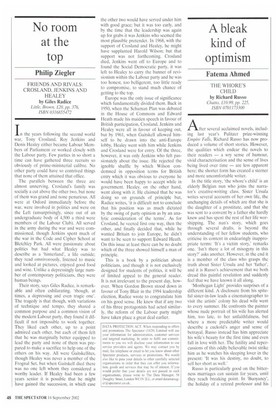No room at the top
Philip Ziegler
FRIENDS AND RIVALS: CROSLAND, JENKINS AND HEALEY by Giles Radice Little, Brown, £20, pp. 376, ISBN 0316855472 In the years following the second world war, Tony Crosland, Roy Jenkins and Denis Healey either became Labour Members of Parliament or worked closely with the Labour party. Few parties in so short a time can have gathered three recruits so obviously of prime-ministerial calibre. No other party could have so contrived things that none of them attained that office.
The parallels between the three are almost unnerving. Crosland's family was socially a cut above the other two, but none of them was grand and none penurious. All were at Oxford immediately before the war, were involved in politics and were on the Left (unsurprisingly, since out of an undergraduate body of 4,500 a third were members of the Labour Club). All served in the army during the war and were commissioned, though Jenkins spent much of the war in the Code and Cipher School at Bletchley Park. All were passionate about politics but had what Healey was to describe as a 'hinterland', a life outside; they read omnivorously, listened to music and looked at pictures, enjoyed good food and wine. Unlike a depressingly large number of contemporary politicians, they were human beings.
Their story, says Giles Radice, is remarkable and often exhilarating, 'though, at times, a depressing and even tragic one'. The tragedy is that though, with variations of technique and tempo, they shared a common purpose and a common vision of the modern Labour party, they found it difficult if not impossible to work together They liked each other, up to a point admired each other, but each of them felt that he was marginally better equipped to lead the party and none of them was prepared to make a sacrifice to help one of the others on his way. All were Gaitskellites, though Healey was never a member of the Frognal Set, but when Gaitskell died there was no one left whom they considered a worthy leader. If Healey had been a few years senior it is possible that he might have gained the succession, in which case
the other two would have served under him with good grace; but it was too early, and by the time that the leadership was again up for grabs it was Jenkins who seemed the most plausible pretender. In 1968, with the support of Crosland and Healey, he might have supplanted Harold Wilson; but that support was not forthcoming. Crosland died, Jenkins went off to Europe and to found the Social Democratic party, it was left to Healey to carry the banner of revisionism within the Labour party and he was too honest, too belligerent, too little ready to compromise, to stand much chance of getting to the top.
Europe was the only issue of significance which fundamentally divided them. Back in 1950, when the Schuman Plan was debated in the House of Commons and Edward Heath made his maiden speech in favour of British participation, Crosland, Jenkins and Healey were all in favour of keeping out, but by 1961, when Gaitskell allowed himself to be drawn into the anti-Europe lobby, Healey went with him while Jenkins and Crosland were for entry. Of the three, however, it was only Jenkins who felt passionately about the issue. He rejected the ignoble shuffle by which Wilson condemned in opposition terms for British entry which it was obvious to everyone he would have been happy to accept while in government. Healey, on the other hand, went along with it. He claimed that he was doing so on grounds of principle but, Radice writes, 'it is difficult not to conclude that his position was as much dictated by the swing of party opinion as by an analytic consideration of the terms'. As for Crosland, he veered first one way, then the other, and finally decided that, while he wanted Britain to join Europe, he didn't want to be seen to support Edward Heath. On this issue at least there can be no doubt which of the three showed himself a man of principle.
This is a book by a politician about politicians, and though it is not exclusively designed for students of politics, it will be of limited appeal to the general reader. It is not irrelevant to the present day, however. When Gordon Brown stood down in favour of Tony Blair in the 1994 leadership election, Radice wrote to congratulate him on his good sense. He knew that if any two of his three protagonists had acted similarly, the reform of the Labour party might have taken place a great deal earlier.
DATA PROTECTION ACT. When responding to offers and promotions The Spectator (1828) Limited will use your information for administration. customer services and targeted marketing. In order to fulfil our commitments to you we will disclose your information to our service providers and agents. We may contact you by mail, fax telephone or email to let you know about other Spectator products, services or promotions. We would also like to pass your details to other carefully selected organisations in order that they can offer you information, goods and services that may be of interest. If you would prefer that your details are not passed to such organisations, please write to The Data Manager, 56 Doughty Street, London WC1N 2LL, or email datamanagergspectator.co.uk.










































































 Previous page
Previous page